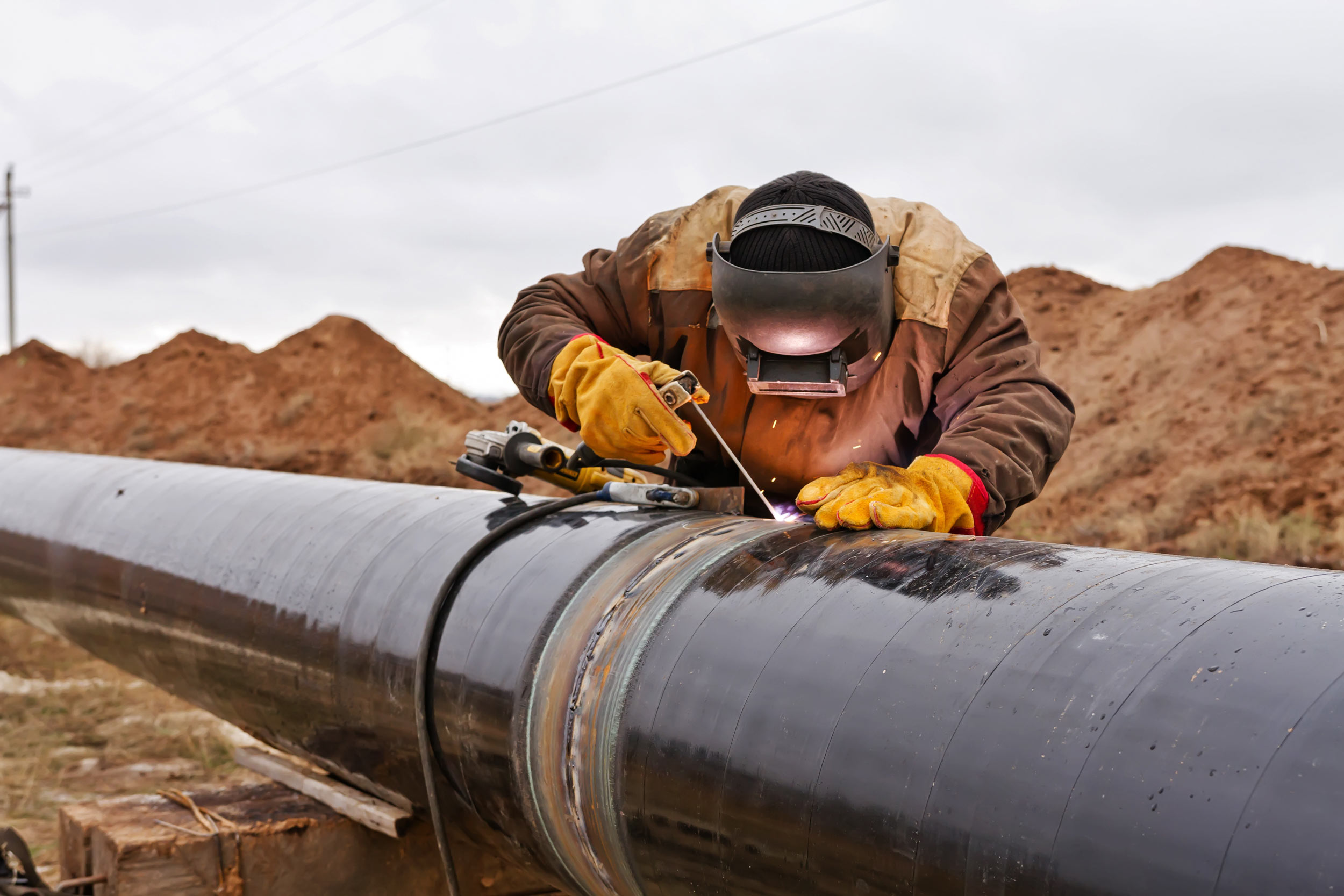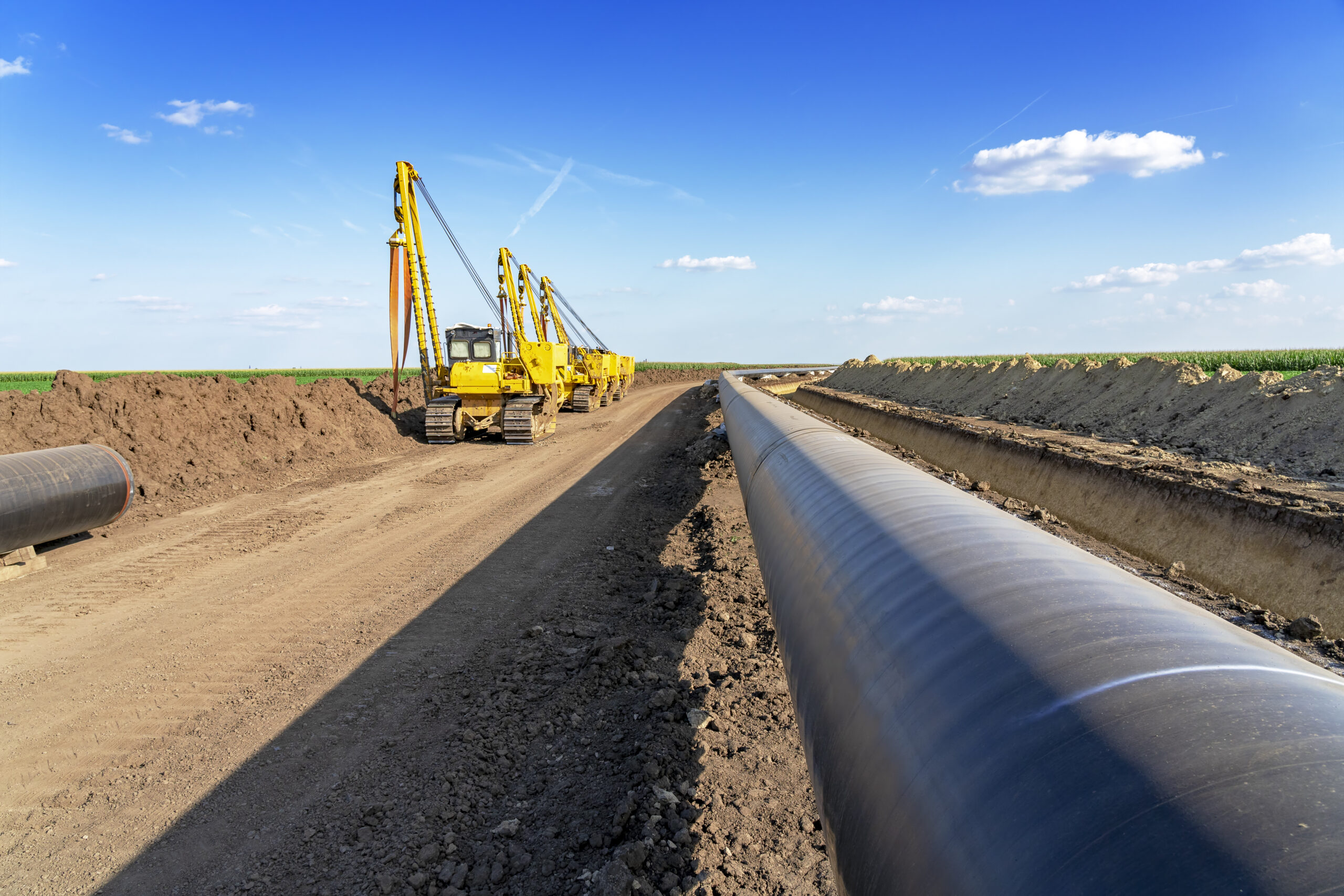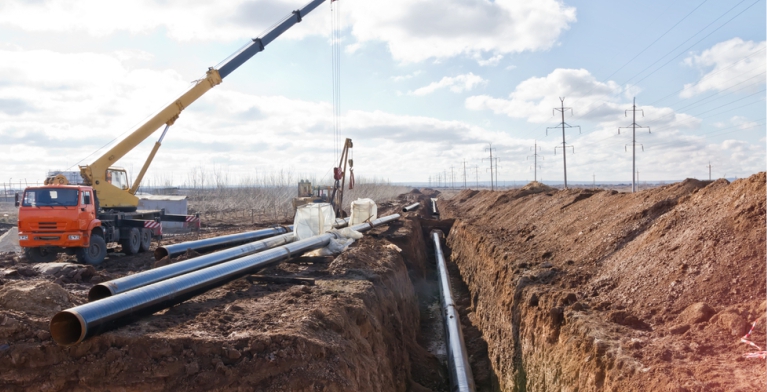Pipeline Construction Excellence: Real-Time Monitoring
Why Pipeline Construction Is Vital for Energy Infrastructure Advancement
Pipeline construction plays an essential duty in the advancement of energy framework, functioning as the foundation for the transport of crucial sources like oil and gas. This complex network not just promotes efficient circulation however also strengthens economic development with task production and local financial investment. Additionally, innovations in safety and security technologies are resolving ecological issues, positioning pipelines as a cornerstone of lasting power approaches. However, the complexities bordering pipeline jobs raise crucial inquiries about regulatory structures and their long-term influence on neighborhoods and ecosystems. Checking out these dimensions reveals a multifaceted story that necessitates mindful consideration.
Role of Pipelines in Power Supply
The vital function of pipelines in energy supply can not be overemphasized, as they work as the foundation of modern-day power facilities. Pipelines are necessary for the efficient transport of numerous forms of power, consisting of oil, gas, and refined items. They help with the movement of these sources from extraction websites to refineries and warehouse, making sure that energy reaches consumers in a timely manner.The construction of pipelines entails precise preparation and adherence to governing requirements, reflecting the complexities of the power market and ecological factors to consider. Efficient pipe networks are created to reduce transit times, reduce costs, and enhance safety, while additionally resolving potential ecological impacts. The capability to transfer large quantities of energy over cross countries makes pipelines a recommended selection for power firms looking to optimize their supply chains.Moreover, pipelines contribute to power safety and security by branching out supply routes and resources. As worldwide power needs change, pipelines allow regions to accessibility numerous power supplies, mitigating dangers related to dependence on single sources. This diversification promotes competitive prices and maintains markets, which is crucial in an increasingly interconnected worldwide economy.In enhancement to their logistical benefits, pipelines support local economic climates by producing work during construction and upkeep stages. The presence of a robust pipe framework likewise draws in financial investments in energy tasks, better improving regional growth. Ultimately, pipelines are important to the energy sector, supplying a reliable and efficient ways of transportation that underpins financial growth and sustainability.

Benefits of Effective Transport
Reliable transport via pipeline systems supplies considerable benefits, consisting of lowered transport expenses and enhanced delivery rate. These benefits not just boost the overall economics of energy circulation however additionally play an essential duty in decreasing the ecological impact related to power transport. As energy demands proceed to increase, the significance of maximizing transport methods becomes progressively apparent.

Lowered Transport Costs
Decreased transport costs represent a significant advantage in the domain of power facilities advancement. The construction of pipelines gives an extra financially feasible methods of carrying energy sources compared to alternate approaches such as trucking or rail transportation. Pipelines, when developed, enable the constant flow of oil, gas, and various other products over lengthy ranges with marginal operational costs.One of the primary factors for reduced transport costs is the effectiveness of pipe systems. They can carry big quantities of products simultaneously, consequently spreading fixed prices over a higher amount of product. This mass transportation capability notably decreases the price each, making power sources extra economical for customers and businesses alike.Additionally, pipelines decrease the risks and prices related to handling and keeping unpredictable products. Unlike rail or road transport, which can sustain delays and damage, pipelines give a much safer and much more consistent approach of energy conveyance. Consequently, this integrity boosts the economic feasibility of power jobs, permitting for far better pricing structures in open markets. Ultimately, minimized transport costs promote a more sustainable power field, promoting bigger gain access to and motivating investment in further development.
Boosted Distribution Rate
Pipelines greatly enhance distribution speed in energy transportation, using an important benefit over conventional methods such as trucking or rail systems. The continual flow of materials with pipelines allows for a steady and efficient transport process, lessening hold-ups related to loading and dumping. This continuous activity is specifically important for power resources, where need can rise and fall rapidly.Moreover, pipelines can operate all the time, unaffected by website traffic problems or weather-related disruptions that can hinder road or rail transport. This dependability guarantees that power items get to consumers swiftly, sustaining functional requirements and reinforcing economic security. In enhancement, the scalability of pipe systems assists in the handling of large volumes of power, which is important for fulfilling the expanding demands of sectors and household sectors.Furthermore, the integration of innovative tracking and control technologies in pipeline systems improves the distribution procedure. These innovations permit real-time monitoring of circulation rates and system stress, guaranteeing that any type of prospective concerns are addressed promptly. Overall, the improved shipment speed supplied by pipelines is a considerable consider enhancing energy framework and ensuring that supply chains continue to be durable and receptive to market demands.
Ecological Impact Considerations
The benefits of speedy power transportation expand beyond logistical benefits; they likewise encompass substantial environmental factors to consider. Reliable pipeline systems enable the transport of power sources with minimal disruption to environments compared to different approaches such as vehicle or rail transport. Pipelines can promote the movement of oil, gas, and various other products in an extremely concentrated way, which lowers the carbon impact related to power distribution.Moreover, pipelines are made with advanced security and tracking technologies that greatly reduced the danger of spills and leaks. A reliable pipe framework reduces the need for regular transportation tasks, which can lead to decreased greenhouse gas emissions over time (Midland Pipeline Construction Authority). The ability to transfer energy sources directly to consumers reduces reliance on more polluting transport approaches, additionally profiting air quality.In addition, strategic pipe positioning can help preserve delicate habitats by complying with existing corridors, consequently minimizing the influence on wildlife and natural landscapes. On the whole, the construction of pipelines not just sustains energy framework growth yet likewise supplies an environmentally liable ways of carrying power, adding to a more lasting future
Economic Effect of Pipeline Projects
The economic effect of pipe tasks prolongs past plain transportation effectiveness, substantially affecting neighborhood and regional economies. These campaigns develop task possibilities throughout both construction and continuous procedures, cultivating community development (Pipeline Construction Excellence). In addition, the stimulation of financial growth through raised financial investment and framework enhancement is an essential benefit of pipeline construction
Job Production Opportunities
While power framework jobs often face scrutiny, they offer substantial job creation possibilities that can positively influence regional economies. Pipeline construction projects call for a varied series of competent labor, including designers, job supervisors, and specialized technicians, as well as unskilled workers for numerous roles. This diverse demand for labor can lead to the development of countless work throughout the construction phase and often causes long-term work chances once the facilities is operational.In enhancement to direct work, pipeline jobs stimulate local economic climates by generating supplementary task chances in sectors such as transport, manufacturing, and friendliness. Regional organizations benefit from raised demand for goods and solutions, adding to total financial wellness. Additionally, the increase of workers can cause enhanced tax obligation earnings for city governments, which can be reinvested in neighborhood solutions and infrastructure.Moreover, pipe construction projects frequently focus on hiring regional employees, fostering a sense of community investment and assistance. By bridging the gap in between power supply and demand, these projects not only enhance energy protection yet additionally function as stimulants for economic advancement, reinforcing the importance of pipe construction in job creation initiatives.
Financial Growth Stimulation
Pipeline jobs act as a powerful financial growth stimulus, driving considerable investments into local and regional economies. The construction and operation of pipelines develop a causal sequence, producing need for products, tools, and solutions (Professional Oilfield Services Texas). This influx of capital sustains neighborhood businesses, from producing to friendliness, cultivating a robust financial environment.Moreover, these jobs create considerable tax obligation earnings for districts and states, which can be reinvested in civil services, framework improvements, and community advancement efforts. The financial advantages expand past instant job production, as experienced labor is commonly required for continuous maintenance and operations, making sure long-lasting employment opportunities.Additionally, the improved power facilities facilitates the effective transportation of resources, possibly reducing energy costs for consumers and companies alike. By enhancing energy access, pipelines can attract brand-new markets and boost development in existing fields, adding to overall economic diversification
Environmental Considerations and Innovations
Harmonizing power needs with environmental stability comes to be increasingly critical as pipe construction broadens. The quest of reliable energy transport must make up ecological effects, demanding innovative practices and innovations that minimize environmental disruption. Modern pipe tasks are increasingly integrating innovative environmental evaluations at every phase, making sure that potential risks are identified and mitigated early in the preparation process.One significant advancement in this field is the adoption of trenchless innovation, which permits the installment of pipelines without substantial surface disturbance. This method decreases environment fragmentation, protects existing communities, and reduces the carbon footprint linked with typical excavation strategies. Additionally, real-time surveillance systems furnished with sensing units allow operators to find leakages or environmental adjustments quickly, therefore promoting prompt feedbacks to potential hazards.Moreover, the incorporation of eco-friendly products and construction strategies is getting grip. Naturally degradable exploration fluids and corrosion-resistant finishes can substantially decrease the ecological footprint of pipeline projects. Companies are likewise committing to bring back habitats post-construction, making use of indigenous plant varieties to aid in environment recovery.Collaboration with environmental firms and regional communities is necessary - Pipeline Construction Authority. Engaging stakeholders in the decision-making procedure fosters openness and advertises lasting methods, making certain that power infrastructure growth straightens with environmental stewardship
Challenges in Pipeline Construction
Amidst the growing need for power facilities, different difficulties complicate the construction of pipelines. One of the primary issues is the geographical irregularity of pipe courses, which can go across varied landscapes, including hills, rivers, and city locations. Each setup calls for tailored design remedies to deal with environmental management, geological security, and logistical constraints.Additionally, the public understanding of pipe projects usually poses pop over here a significant obstacle. Regional neighborhoods might share problems pertaining to potential environmental impacts, safety dangers, and interruption throughout construction. This resistance can lead to hold-ups, raised expenses, and the necessity for comprehensive neighborhood interaction approaches to cultivate acceptance.Moreover, labor lacks in knowledgeable professions even more complicate pipe construction efforts. As the need for power framework grows, the accessibility of seasoned personnel diminishes, which can result in job delays and raised labor expenses. The pipe sector must buy labor force development initiatives to cultivate a proficient labor swimming pool with the ability of fulfilling the progressing demands.Safety continues to be an extremely important issue throughout the construction process. The market encounters the challenge of ensuring that all safety and security procedures are abided by, as even minor lapses can lead to substantial mishaps. This necessitates rigorous training and oversight to preserve functional integrity.Lastly, rising and fall material expenses can influence task spending plans and timelines. The need for high-grade materials, coupled with market volatility, calls for mindful financial planning and danger reduction methods to maintain tasks on track. Resolving these obstacles is important for the successful and effective construction of pipelines as component of a robust power framework.
Regulative Framework and Compliance
The governing structure governing pipe construction is complicated and multifaceted, needing compliance with a selection of federal, state, and regional laws. At the government degree, firms such as the Federal Power Regulatory Compensation (FERC) and the Pipeline and Hazardous Products Safety And Security Administration (PHMSA) play important functions in overseeing pipe tasks. FERC manages the transport of gas and oil, accepting projects based upon economic demand and public passion, while PHMSA concentrates on safety standards and the integrity of pipeline operations.State regulations can differ significantly, with individual states imposing their very own allowing procedures, safety regulations, and ecological analyses. For example, state public energy payments might need additional examination of suggested courses to ensure marginal interruption to areas and communities. Compliance with the National Environmental Policy Act (NEPA) is likewise needed, mandating comprehensive ecological impact assessments prior to job approval.Local policies may better make complex the conformity landscape, as municipalities frequently have specific zoning laws, land usage regulations, and neighborhood interaction needs. Engaging with neighborhood stakeholders is not only a regulative need yet likewise a best method to facilitate smoother task execution.Moreover, the regulative landscape is constantly evolving, affected by public belief, technical innovations, and environmental plans, requiring continuous vigilance from pipe operators. Guiding via this detailed regulative framework is necessary for confirming that pipe construction jobs are not only legally compliant however likewise socially accountable and environmentally lasting, thereby adding to the total efficiency of energy framework advancement.
Future Fads in Pipeline Framework
A considerable change is underway in pipeline infrastructure, driven by innovations in modern technology, progressing energy needs, and increasing environmental awareness. As the global power landscape shifts towards renewable sources, pipeline systems are adapting to accommodate diverse energy types, consisting of gas and biofuels, while also integrating more sophisticated tracking and safety and security technologies.One noteworthy fad is the incorporation of electronic remedies, such as Web of Things (IoT) devices and expert system (AI), which boost real-time surveillance and anticipating maintenance capacities. These technologies not just improve functional efficiency however also considerably decrease the danger of leaks and mishaps, making sure higher environmental management. In addition, using YOURURL.com innovative products, such as composite pipelines, is getting grip due to their longevity and resistance to deterioration, more expanding the lifespan of pipe systems.Moreover, the emphasis on sustainability is motivating the advancement of greener construction practices. Strategies such as trenchless innovation minimize land disturbance and ecological influence, straightening pipeline jobs with contemporary ecological standards. Furthermore, regulative frameworks are developing to advertise openness and liability in pipeline procedures, guaranteeing stakeholders are extra informed about potential threats and advantages.
Frequently Asked Inquiries
Exactly How Do Pipelines Compare to Other Transportation Approaches for Energy Resources?
Pipelines offer an affordable, effective, and eco-friendly method for delivering energy resources compared to choices like trucks and trains, which typically incur greater operational expenses, greater land usage, and raised greenhouse gas discharges. - Pipeline Construction Authority

What Materials Are Typically Utilized in Pipeline Construction?
Typical materials used in pipe construction consist of carbon steel, stainless steel, and plastic composites. These materials are picked for their stamina, durability, corrosion resistance, and suitability for numerous environmental conditions and kinds of transferred energy resources.

Exactly how Long Does It Commonly Require To Build a Pipeline?
The period for pipe construction differs substantially based on aspects such as size, terrain, and governing demands. Generally, it can vary from several months to a few years, depending upon task complexity and environmental factors to consider.
Who Are the Trick Stakeholders in Pipeline Projects?
Trick stakeholders in pipeline projects consist of government firms, regulative bodies, power companies, ecological organizations, neighborhood communities, and landowners - Midland Pipeline Construction Authority. Each group plays an important role in preparation, Get the facts permitting, construction, and continuous procedures of pipeline facilities
What Are the Main Precaution During Pipeline Construction?
Throughout pipeline construction, primary safety steps include extensive website assessments, adherence to regulative criteria, detailed training for employees, making use of personal safety tools, and continuous surveillance of environmental conditions to alleviate dangers and ensure operational security.